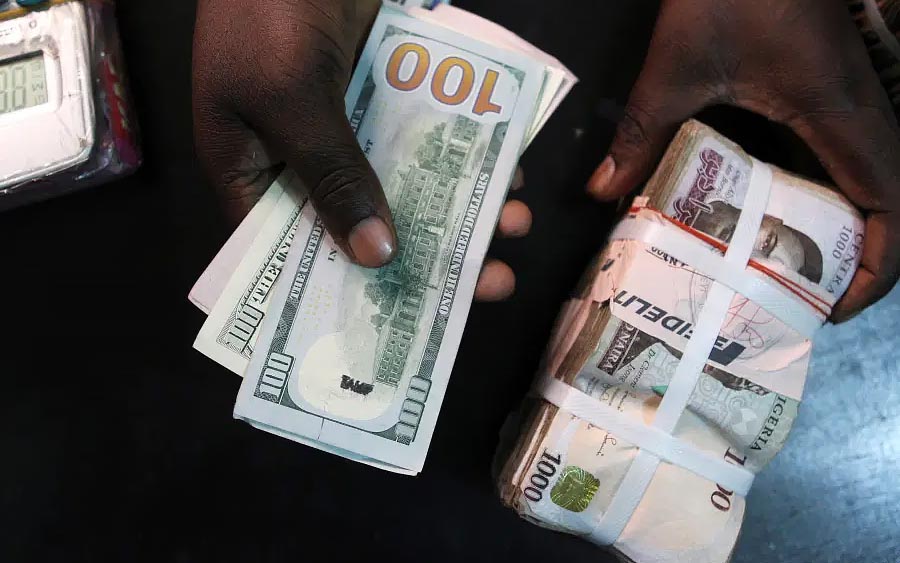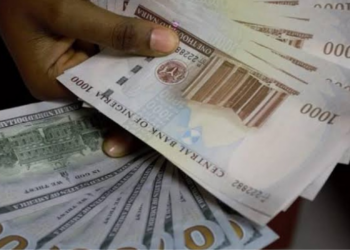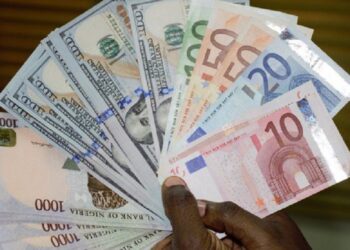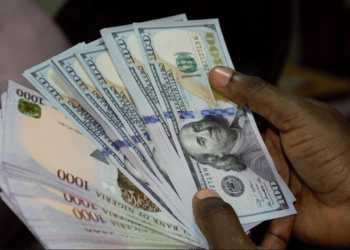Thursday, 2nd September 2021: The exchange rate between the naira and the US dollar closed at N411.67/$1 at the Investors and Exporters window, where forex is traded officially.
Naira depreciated against the US dollar to close at N411.67/$1 on Thursday, representing a 17 kobo drop when compared to N411.50/$1 recorded at the close of trading on Wednesday, 1st September 2021.
Also, the naira hit a new record low, depreciating against the dollar at the parallel market, as it closed at N530/$1 on Thursday, 2nd September 2021, representing a N2 drop when compared to N528/$1 recorded on the previous trading day.
The naira fell to an all-time low against the US dollars in the black market due to increased demand for foreign exchange by importers who cannot access forex at the official window.
According to Reuters, the local currency is expected to ease on the black market in the coming week after the CBN orders deposit money banks to publish on their website names of individuals that violate rules on forex transactions.
Trading at the official NAFEX window
The naira depreciated against the US dollar on Thursday, 2nd September 2021 to close at N411.67 to a dollar, representing a 0.04% loss when compared to N411.50/$1 recorded on the previous trading day.
The opening indicative rate closed at N411.78/$1 on Thursday, September 2, as against N411.58/$1 recorded on Wednesday, representing a 20 kobo depreciation.
An exchange rate of N413 to a dollar was the highest rate recorded during intra-day trading before it settled at N411.67/$1, while it sold for as low as N400/$1 during intra-day trading.
Meanwhile, forex turnover at the Investors and Exporters (I&E) window rose significantly by 570.8% on Wednesday, 1st September 2021.
According to data from FMDQ, forex turnover decreased from $486.31 million recorded on Wednesday to $296.34 million on Thursday, 2nd September 2021.
Cryptocurrency watch
The world’s most popular and largest cryptocurrency, Bitcoin, was up by 0.63% on Friday morning to trade at $49,717.96, after broaching the $50,000 level once again on Thursday as the wider cryptocurrency market continued its rally.
Bitcoin rose as high as $50,362 on Thursday, having briefly surpassed $50,000 on August 23 as well, a level it hadn’t hit since mid-May. Ether, the second-largest crypto, rose as much as 3% on Thursday to $3,843, continuing a strong run after its London upgrade early last month.
Through the early hours on Thursday, the crypto total market capitalization was initially down to $2,185 billion before rising to a high $2,234 billion.
The world’s second-largest cryptocurrency was recently trading at $3,809.86, up by 1.44% over the past 24 hours.
Crude oil price
Brent crude oil was up by 0.01%, early on Friday to trade at $73.04 per barrel sustaining its gain on Thursday with WTI Crude trading above $70 a barrel on Thursday for the first time in a month, driven by bullish U.S. inventory and demand data and a weaker dollar.
Oil headed for a back-to-back weekly gain, supported by signs that the global crude market is tightening and a weaker U.S. currency.
U.S. government data this week showed a larger-than-expected draw in crude inventories in the run-up to the disruption caused by Hurricane Ida.
The OPEC+ decision from Wednesday to proceed with the plans to continue easing cuts by another 400,000 bpd in October also supported oil prices, despite lingering fears about the surge in Covid cases
The West Texas Intermediate (WTI) was down by 0.19% on Friday Morning to trade at $69.86 per barrel after rising above the $70 dollar mark the previous day.
Natural gas was down by 0.45% to trade at $4,620 early Friday, Bonny Light Crude closed the day on a positive note as it rose by 3.74% to trade at $72.04, while OPEC Basket was down by 0.29% to close at $71.27.
External reserve
Nigeria’s foreign reserve rose by $82 million as it recorded its sixth increase in over 2 weeks to close at $34.1 billion on Wednesday, 1st September 2021, compared to $34.018 billion recorded as of the previous day. The latest increase represents a 0.24% boost in the country’s foreign reserve.
In the same vein, the reserve level has also gained $697 million month-to-date compared to $33.403 billion recorded as of the beginning of the month.
However, its year-to-date change shows a $1.453 billion loss compared to $35.37 billion recorded as of 31st December 2021.
While recent reports have suggested that Nigeria’s foreign reserve position could grow as high as $40 billion by the end of September 2021, the recent decline in the external reserve could be attributed to the decline recorded in the global crude oil market in recent weeks.


















